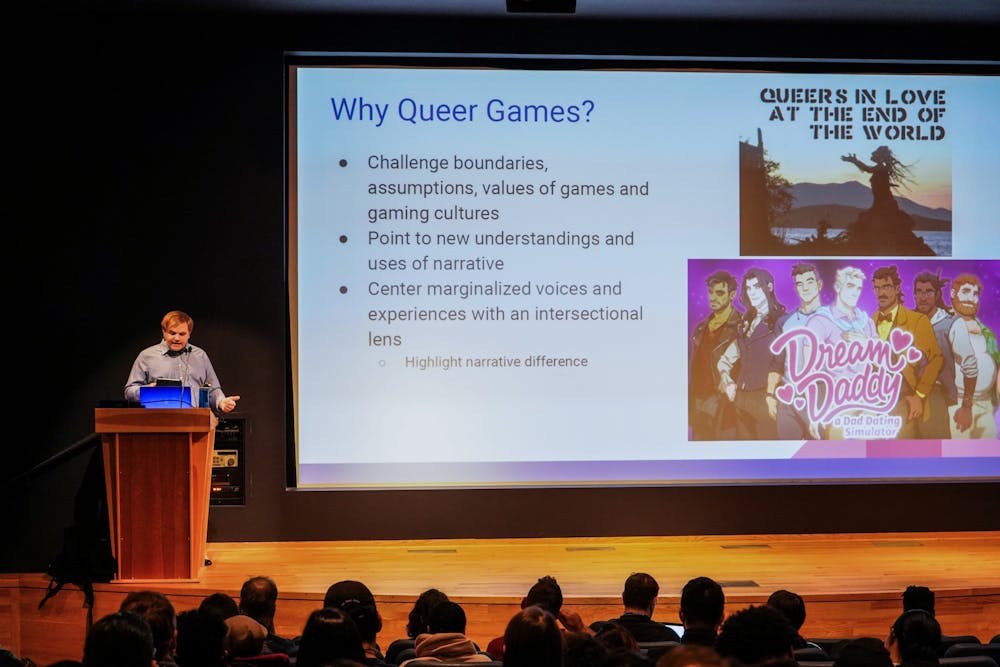While social attitudes have been changing in recent years, LGBTQ+ representation remains limited in all forms of media, including video games.
But the unique qualities in video games may allow for representation even without LGBTQ+ characters, through “queer naratives.”
UB’s Media Studies Department kicked off its Performances, Lectures and Screenings in Media Art (PLASMA) speaker series –– which brings artists and scholars from around the world to talk about art and new ideas within media, from film, to TV and now video games –– with Cody Mejeur on Monday night. Mejeur, a visiting professor in DMS, studies LGBTQ+ representation, feminism and social justice within video game narratives, which they discussed at the event.
Their PLASMA, titled ‘Playing and Thinking Narratively: Video Games As/For Social Justice,’ focused on how narratives in games can have “queer potential” even if there are no overtly LGBTQ+ characters or stories. Mejeur said they believe this is important, as most mainstream games don’t have any LGBTQ+ content.
“When you have sort of a straight line through a story, it’s often progressing towards something,” Mejeur said, “And, with most stories, it’s progressing towards some sort of normative end. The evil showed up, it screwed everything up and now we want to return things to normal. A queer narrative is trying to mess with that. … It’s not about returning things to normal because ‘normal’ was a problematic thing to begin with.”
“Queer narratives” are stories that do not follow the typical western narrative structure. Instead of having one narrative climax and everything returning to normal, queer narratives may have multiple climaxes or none at all, according to Mejeur, as they break away from the storytelling norm.
During the lecture, Mejeur used games like “The Vanishing of Ethan Carter,” “P.T.” and “Gone Home” as examples of video games with queer narratives. While these three games have different plots, themes and gameplay mechanics, all three of them express their narratives in non-linear ways and force the player to interact with and shape the story on their own. The three games already have “queer potential,” regardless of whether the narrative actually features LGBTQ+ characters, because they break away from normality, challenge preconceptions and give players the power to create their own stories.
Bryant Mercedes, a junior media production major taking PLASMA for credit, found the lecture to be “eye-opening.”
“I never really paid attention to stuff like this when I play video games and I play a whole lot of video games,” Mercedes said. “I’ll definitely be paying a little more attention when I’m playing a story mode to see what things would affect it.”
Nicole Garcia is also a junior media production major and a student in the class. Similarly to Mercedes, the lecture helped her see the world in a different way.
“I kind of want to get more into video games in the sense of how we as individuals could actually impact everyone else [through video game narratives],” Garcia said.
Mejeur, along with publishing academic articles on the topic, works with the LGBTQ Video Game Archive to catalog and preserve LGBTQ+ representation in video games, and they are a Diversity Officer for the Digital Games Research Association. At the moment, Mejeur is also working on a 3D walking simulator game titled “Trans Folks Walking” that attempts to simulate trans experiences through short interactive scenarios.
Mejeur hopes that their lectures and research on video games can help people realize the limitations most mainstream games have and the potential the medium has in the future.
“My end goal was to get people to [think] like ‘yeah, we can look at all these terrible things that exist in game culture, but we can also get active about changing those things,’” Mejeur said. “I think that’s true more broadly too. Even though some of these problems seem overwhelming, we can get active about them.”
Anastasia Wilds is an assistant arts editor and can be reached at anastasia.wilds@ubspectrum.com and on Twitter @AnastasiaWilds
Anastasia Wilds is the senior arts editor. She has been writing for newspapers since her junior year of high school, and she has appreciated all forms of art for even longer. When she’s not writing, she is either reading, listening to music, hanging out with her friends on discord or streaming on Twitch.





